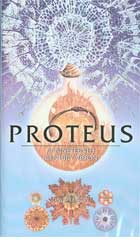
Proteus: A Nineteenth Century Vision 2004
Distributed by First Run/Icarus Films, 32 Court St., 21st Floor, Brooklyn, NY 11201; 800-876-1710
Producer n/a
Directed by David Lebrun
VHS, color, 59 min.
Sr. High - Adult
Biography, Biology, Evolution, History, Philosophy, Physiology, Religious Studies
Date Entered: 03/02/2005
Reviewed by Meghann Matwichuk, Morris Library, University of DelawareErnst Haeckel, a 19th century evolutionary theorist driven by artistic passions, is the focus of this captivating exploration of the relationship between science and art. Haeckel devoted much of his life to the study of a tiny creature called the radiolarian - a microscopic organism whose defining feature is its skeleton, which consists of a crystalline, web like structure and exists in an astounding variety of forms in the depths of the sea. The film documents the cultural, artistic, literary, and scientific events that conspired to drive Haeckel's life-long obsession with finding pattern in the natural world.
The filmmaker structures the program following three stages of Haeckel's professional development. Presented first are the events that presaged his fascination with the outer (scientific) and the inner (artistic) worlds. The cultural movements that set the stage for Haeckel's inner conflict (the objectivity of the Enlightenment and subjective Romanticism) give rise to a personal struggle in which he vacillates between research and landscape painting. New technological and scientific developments, such as the exploratory voyage of the HMS Challenger, set the stage for Haeckel's renewed commitment to marine biology, and he devotes ten years to the documentation of Radiolaria collected during the expedition. Finally, Haeckel is depicted as an accomplished and revered professor whose controversial ideas preceded the likes of Darwin and who inspired such prominent and disparate thinkers as Lenin, Freud, D.H. Lawrence, and Hitler.
The filmmaker effectively frames Haeckel's inner paradox by paralleling his search with that of the seaman in Coleridge's Rhyme of the Ancient Mariner. The mariner's failure of vision and inability to reconcile the split between spirit and nature sets the urgent and passionate tone for the depiction of Haeckel's life's work. This framing device also underlines many of the themes that would inform Haeckel's worldview, such as the transformation of the spirit via the sea and the lure and mystery of its depths for humankind - a phenomenon which would find its match two centuries later as we began to explore outer space.
Animation techniques are coupled with the use of photographs, drawings, illustrations, editorial cartoons, etchings, and paintings. The inventive use of still images gives the production a unique, compelling style and yields a surprisingly fluid dynamic. Sketches of an awe-inspiring variety of radiolarian are flashed rapid-fire in several sequences, communicating the wonder and diversity of these underwater beings. The often colorful portraits of Haeckel's discoveries and natural landscapes are contrasted with black and white etchings of scenes that show the mundane picture of scientific society he rebelled against. Background sound effects combined with panning shots and skillful editing simulates the rhythm of live action. Voiceover actors read Haeckel's thoughts and writings and those of his influences and contemporaries. Vibrant musical compositions help convey the emotion that motivated and stemmed from Haeckel's discoveries. This examination of Haeckel's life and times would serve as an exceptional resource in a variety of subject areas including biology, history, theology, and philosophy. It does a wonderful job of showing the intersection of these disciplines and how they reflect the visions of their time.
Awards
- Outstanding Creative Achievement Award, 2004 Santa Barbara Film Festival
- Best Documentary, 2004 Philadelphia Film Festival
- Best Documentary, 2004 Santa Cruz Film Festival